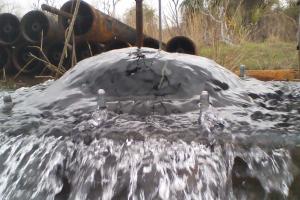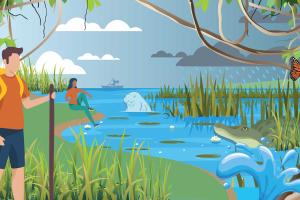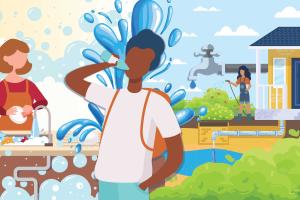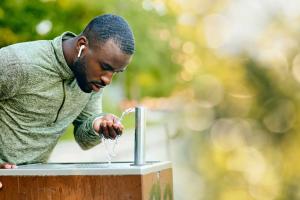Search Content
Displaying results 41 - 60 of 4753
Improving Water Quality Through Well Plugging Every day, millions of gallons of water are contaminated or wasted throughout the Southwest Florida Water Management District by free-flowing, improperly constructed, deteriorated or abandoned artesian wells.Many of these wells were built before current well construction standards were established. Therefore, many of the wells:
- Do not have enough casing and expose several aquifers of varying water quality to one… Read more
Water is restless; it likes to move on a constant journey known as the water cycle. Gravity makes it flow downhill, off your roof, into creeks, down rivers and even over giant waterfalls. Some water soaks into the ground through percolation, but most of it ends up filling the oceans, which cover over two-thirds of the planet.
The water cycle doesn’t end in the oceans though. Water at the sea’s surface is able to… Read more
To conserve water means to use it wisely and to not be wasteful. Conserving water is a very important part of making sure there is enough water to meet the needs of humans and the environment. And even though we might have enough fresh water available to meet our needs today, we also need to plan for the future.
The Southwest Florida Water Management District (District), along with other local governments and organizations, are responsible for managing… Read more
Water is restless; it likes to move. Gravity makes it flow downhill, off your roof, into creeks, down rivers and even over giant waterfalls. Some water sinks into the ground, but most of it ends up filling the oceans, which cover over two-thirds of the planet.
The water cycle doesn’t end in the oceans though. Water at the sea’s surface is able to defy gravity and climb back up into the sky. How? Because water isn’t always a liquid.… Read more
Water utilities can reduce per capita water use and maintain revenues by using water-conserving rate structures. Your water management district can provide information and tools to help utilities accomplish these goals.
Why Use Rates to Conserve?
In many areas of Florida, water supplies are stressed as growth fuels new demand for water. To ensure a sustainable water supply, utilities are tapping alternative sources including conservation. The pricing of water is one… Read more
Do you know where your drinking water comes from? You might have poured it from a tap or bought it at the store, but it had to come from somewhere before that. Any guesses?
The ocean? That would be a good guess because the oceans contain most of earth’s water, about 97%! But would you drink a glass of seawater?
No! The salt would make you sick.
We need fresh water. Not just any fresh water though. Did you know most of the world’… Read more
Do you know where your drinking water comes from? You might have poured it from a tap or bought it at the store, but it had to come from somewhere before that. Any guesses?
The ocean? That would be a good guess because the oceans contain most of earth’s water, about 97%! But would you drink a glass of seawater?
No! The salt would make you sick.
We need fresh water. Not just any fresh water though. Did you know most of the world’s fresh water is frozen… Read more
Recycled Water – Safely Supplying Florida’s Future. What is Potable Reuse?Potable reuse refers to highly treated recycled water from various sources people can use for drinking, cooking or bathing.Is Recycled Water Safe for People to Drink?Yes. This type of recycled water uses proven technology to make the water safe. The water meets or is a higher quality than strict state and federal drinking water … Read more
Many homes use about half of their water outside! That’s a lot of good water going to the grass. Here are some ways you can avoid wasting water in your yard:
Wait until wilt
Don’t water your grass or plants if they don’t need it. Too much water can wash away plant food and make it easier for pests to attack. A lawn doesn’t need to be watered much in the winter when it’s cool, or during the summer when it rains a lot.
Don’t water in the rain (singing is OK)
If… Read more
In addition to groundwater, Florida also has many different surface water bodies. Surface waters are those found above ground. In Florida, that includes around 7,700 lakes, 50,000 miles of rivers and streams, and 700 springs! Surface waters are home to many different types of plants and animals. They also provide a place for people who live in Florida, or come to visit, to enjoy many recreational activities, such as swimming, kayaking,… Read more
What are minimum flows and minimum water levels (MFLs)?In short, an MFL sets a limit on how much water can be withdrawn from various water resources to prevent significant harm occurring to those resources or the ecology of the area.What does “significant harm” mean?The Florida legislature did not define the term ‘significant harm.’ However, the District has developed criteria for significant harm to various types of water resources. The… Read more
You’ve learned how water continuously moves through the natural water cycle, but did you know that humans have created the urban water cycle? The urban water cycle refers to the ways that humans have engineered systems to capture, clean, use and return water to the environment.
With an increase in population and growing demand for water, the urban water cycle can put pressure on traditional water supply sources, such as groundwater… Read more
Water Quality Basics
Water quality is a description of the condition of water, similar to how we refer to our health to describe the condition of the human body. Water quality can refer to the chemical, physical and biological condition of water. It also includes evaluating whether water is safe to be used for a specific purpose like drinking, recreation or to support wildlife.
You can’t tell much about the quality of water simply by looking at it. In… Read more
Introduction
You can’t tell much about the quality of water simply by looking at it; most pollutants are invisible to our eyes. And since water is such a vast network (made up of rivers, springs, creeks, swamps, estuaries, wetlands, lakes, bays, etc.), water quality can be difficult to test.
Explore the links above to find out more about the history of water testing, pollution, the different tools used to test water, and how you can get involved and even test the… Read more
Both the United States government and Florida have adopted water quality goals and standards. Each water body has its own standards. For example, water used for drinking has to be much cleaner than water used for crop irrigation or to cool machinery in a factory. Scientists use information from water monitoring to determine how a water body rates based on its intended use. If scientists rate water quality as GOOD, then the water can fully support its… Read more
Certifying excellence in water conservation, saving resources and protecting the environmentThe Florida Water Starsm program is a voluntary certification program for new residential and commercial construction and existing home renovation. The program encourages water efficiency in appliances, plumbing fixtures, irrigation systems and landscapes, as well as water quality benefits from best management practices in landscapes. An average Florida Water Star homeowner… Read more
About Water Quality
Both the United States government and Florida have adopted water quality goals and standards. Each water body has its own standards. For example, water used for drinking has to be much cleaner than water used for crop irrigation or to cool machinery in a factory. Scientists use information from water monitoring to determine how a water body rates based on its intended use. If scientists rate water quality as GOOD, then the water can fully support… Read more
Scientists use many different instruments to determine the quality of water, including Secchi disks, probes, nets, gauges and meters. Water quality is not just measured by direct sampling. Information can also be derived from aerial and satellite photographs, by observing the surrounding environment and by collecting organisms that live in the body of water.
Although you might not have access to the resources of a scientist, there are some simple tests you can perform to… Read more
Don’t allow your water bill to drain additional money from your restaurant’s profits. Many water-saving tips take little effort or expense, while some require a financial investment that often pays back over time. Regardless of your restaurant’s size, there are simple low-cost steps to save water and money.
Educate Your Staff and Guests
Conservation at your restaurant starts with you, but management can’t do it alone. It is important to share best management practices… Read more
We all play a role in protecting and conserving our water resources, both above and below ground. But we need leaders like YOU to help inspire others and become a water superhero!
How can you become a water superhero? Start by incorporating some of the actions in the chart below into your everyday life. It’s also important to educate your friends, family and neighbors to encourage them to do the same!
Ways to Conserve Water
- Take short… Read more








